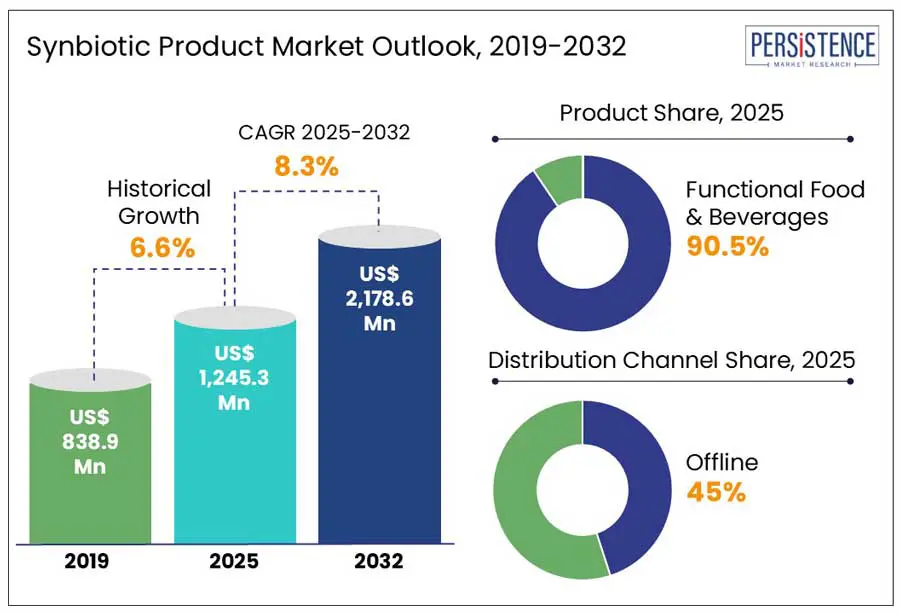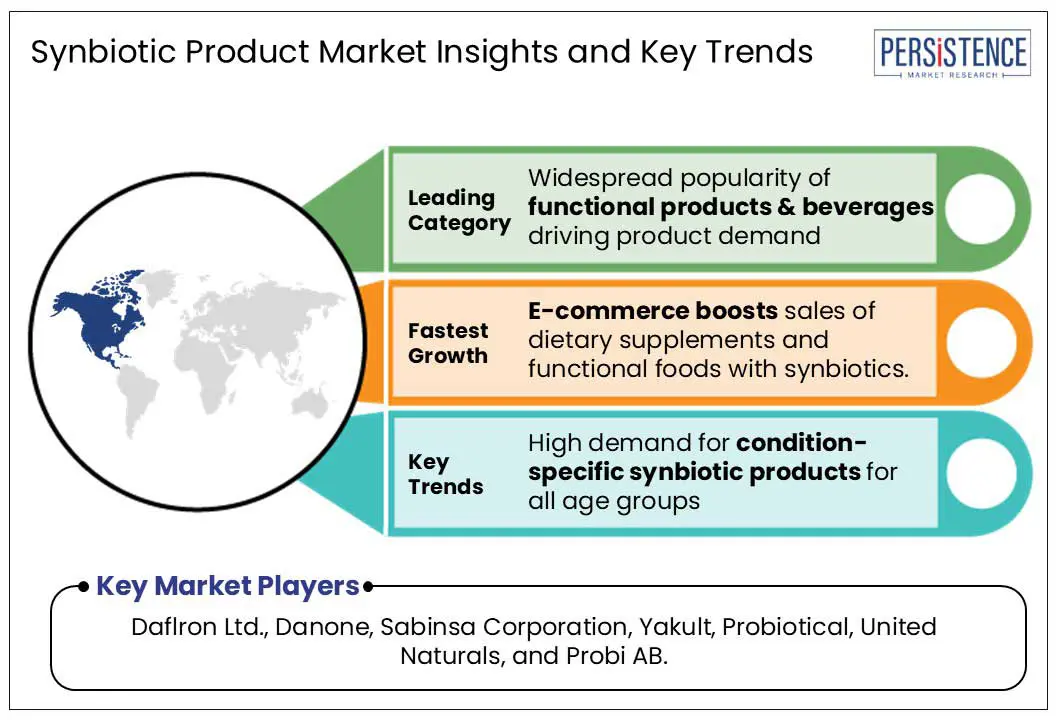ID: PMRREP35314| 197 Pages | 13 May 2025 | Format: PDF, Excel, PPT* | Food and Beverages

The global synbiotic product market size is projected to rise from US$ 1,245.30 Mn in 2025 to US$ 2,178.60 Mn by 2032. The market is further anticipated to register a CAGR of 8.30% during the forecast period from 2025 to 2032. According to the Persistence Market Research report, increasing health consciousness, aging population, rising disposable incomes among the younger demographic, and stronger preference for fortified and functional food owing to hectic lifestyles and eating habits propel market growth.
There is a growing awareness of the link between inflammation and gut health to serious illnesses such as cancer. The post-COVID era has revolutionized the health products market, with synbiotic products experiencing significant growth. For instance, according to a study published by National Library of Medicine (NLM) in March 2025, non-food prebiotics, probiotics, and synbiotics have tripled in the last two decades.
Due to the growing fitness product industry and strategic efforts by fitness influencers, Gen Z and millennials are increasingly knowledgeable about functional foods and ingredients, including synbiotic products, spurring market growth. Companies, such as United Natural Foods, Hansen Holding A/S, Sabinsa, Biomin America Inc., and Probiotical S.p.A. are introducing numerous synbiotic products that appeal to both young and adults alike. Overall, the market offers lucrative growth opportunities for industry players.

Key Industry Highlights
|
Global Market Attribute |
Key Insights |
|
Synbiotic Product Market Size (2025E) |
US$ 1,245.30 Mn |
|
Market Value Forecast (2032F) |
US$ 2,178.60 Mn |
|
Projected Growth (CAGR 2025 to 2032) |
8.30% |
|
Historical Market Growth (CAGR 2019 to 2024) |
6.6% |
The synbiotic product market is witnessing strong growth, driven by evolving lifestyles and rising health concerns. Gut-related issues such as IBS and acidity are on the rise among youth, largely due to fast food consumption and irregular eating habits. As a result, many are incorporating synbiotic products for better digestive health. Fitness-conscious youth, particularly those consuming whey protein, are also opting for protein powders fortified with synbiotic products to prevent gut flora disruption. Social media influencers significantly impact dietary trends among young population, thereby driving market growth. Multiple studies have linked poor gut health to obesity, mental health, and various cancers, emphasizing the need to incorporate synbiotics into the diet to boost micronutrient absorption and reduce inflammation. Older adults who believe in preventive healthcare are incorporating synbiotic products for digestion, mental clarity, and cardiovascular health, as recommended by healthcare professionals, positioning them as a key driver.
The trend of incorporating synbiotic formulations into everyday food and beverage products such as yogurts, fermented drinks, nutritional bars, and alternate dairy products provides universal accessibility to synbiotic products. The employment of futuristic technologies, such as sonication, nanoencapsulation, microencapsulation, freeze-drying, 3D printing, and bio-based textiles, is anticipated to drive market growth. in the foreseeable future.
High manufacturing and R&D costs due to the scientific complexity of the gut microbiome remain a major obstacle to the synbiotic product market growth. Producing microbial strains into consumer products is a complex and time-consuming process, especially to ensure the desired dosage remains effective through the product's shelf life. Additionally, storage poses significant challenges as maintaining specific environmental conditions is critical to preserving the stability and efficacy of bacterial strains. Failure to do so can lead to degradation, further increasing overhead costs. These economic constraints will limit wider adoption of premium synbiotic solutions in emerging economies, impeding market growth.
Despite the benefits offered by synbiotic products for gut health, overconsumption beyond prescribed limits can lead causes abdominal discomfort or imbalances in gut flora. These concerns may discourage consumers, hindering market expansion. Therefore, consumer education and strong regulatory oversight are integral in market development.
The pharmaceutical sector is witnessing a significant demand for condition-specific synbiotic products, driven by numerous studies linking gut health to overall wellness. This provides pharmaceutical companies opportunities to develop targeted synbiotic formulations to hinder various health issues. A study published in July 2023 in NLB highlighted the connection between gut microbiota and mental health disorders such as anxiety and depression. For example, in 2023, Evonic launched IN VIVO BIOTICS butyrate, a synbiotic combination of Bacillus subtilis and L-Alanyl-L-Glutamine that encourages butyrate production, which supports mental health.
Additionally, synbiotics play a key role in managing obesity by improving metabolism, and regulating diabetes. The growing trend toward bespoke healthcare solutions for infants, sportsmen, and the geriatric population opens doors for tailor-made synbiotic products to suit individual gut microbiota profiles. With additional clinical evidence and regulatory approvals, condition-specific synbiotics offer pharmaceutical companies a growing market for fact-based health solutions.
By product type, the synbiotic product market is bifurcated into functional food & beverages and dietary supplements. The functional food & beverages segment is projected to hold a revenue share of about 90.5% in 2025, due to the growing health awareness and the rise of numerous lifestyle diseases among younger population, driven by sedentary work patterns. With intense job pressures leaving little time for meal planning and preparation, nutritional deficiencies have become rampant, thereby fueling the demand for convenient health solutions such as yogurts, drinks, and snack bars fortified with synbiotic products, which can be consumed on the go.
The dietary supplements segment is anticipated to witness the fastest growth in the coming years. Both young and old are opting for dietary supplements due to rising awareness of nutritional deficiencies that arise from restrictive diets. Dietary supplements that integrate prebiotics and probiotics improve immunity and general health by boosting digestive health, thereby spurring market growth. Available in various forms, such as tablets, capsules, gummies, and powders, they cater to diverse consumer preferences. The growing trend of personalized nutrition and the shift toward preventive healthcare are also anticipated to drive segment growth between 2025 and 2032.
Based on distribution channel, the offline channel (pharmacies/health stores, supermarket/hypermarkets, and convenience stores) is anticipated to dominate the synbiotic product market, holding the largest revenue share in 2025. A major portion of synbiotic product sales happens through pharmacies and health stores. Express Scripts, CVS Pharmacy and Walgreens are the major pharmacy chains in the U.S. Similarly, in emerging economies such as India, Apollo Pharmacy, Medplus, and Wellness Forever play a major role. Supermarkets and hypermarkets benefit from high foot traffic and display wide varieties of over-the-counter dietary supplements, encouraging shoppers to make impulse buys alongside routine shopping.
Online segment, on the other hand, is the fastest-growing distribution channel, fueled by shifting consumer shopping behaviors, especially since the COVID-19 pandemic. In India, platforms such as 1mg, Netmeds, and PharmEasy have gained popularity. Online forums and platforms empower tech-savvy consumers to research synbiotic products, read detailed reviews, and evaluate user experiences before making a purchase. Many e-commerce sites also offer subscription services, allowing for regular, hassle-free deliveries, spurring market growth.

North America is anticipated to lead with a revenue share of 40% in 2025. Many consumers in the region are aware of preventive healthcare, driving the demand for dietary supplements and beverages fortified with synbiotic products. Additionally, the strong presence of specialty retailers, well-established e-commerce platforms, and subscription-based services further contributes to market expansion. The region's aging population consumes synbiotic products to address digestive issues upon medical recommendation, further supporting product demand. Online forums also play an important role in educating consumers.
The U.S. market is expected to witness significant growth owing to the strong presence of pharmacy retailers, a wide network of retail outlets, and the influence of celebrity endorsements and medical professionals, which are reshaping consumer behavior. The increasing prevalence of gastric issues, primarily caused by unhealthy eating habits and the consumption of highly processed foods, is another critical factor driving market expansion.
Asia Pacific market is likely to witness the fastest-growth in the coming years. Increasing disposable incomes in India and China are encouraging consumers to explore various health supplements. Wide social media usage is also influencing lifestyle choices, with many people following celebrity fitness influencers. Growing awareness of prebiotics and probiotics is also contributing to demand, as more consumers opt for over-the-counter synbiotic products to manage obesity and support gut health.
China synbiotics product industry is anticipated to grow at a CAGR of 9% over the forecast period, driven by urbanization, rising disposable incomes, increased health-consciousness, and the cultural shift toward Western diets and influencers. China-Biotics, Inc. and Bayer are the key players in China, launching innovative products.
Europe is anticipated to dominate and witness substantial growth in the market from 2025 to 2032. Consumers here place strong emphasis on health and fitness, rising demand for functional food, beverages and nutritional supplements. Europe implements the most stringent measures to ensure synbiotic product quality, ensuring clean labeling in case of food items. Consumers in Europe are aware of various health trends and it also hosts a wide network of retail shops and pharmacies. People have a proclivity for natural and clean products, further boosting market growth.
Germany is the fastest growing market in region. High demand for fortified dairy products, supplements, and child-focused health solutions is powering market growth. Key trends, such as clinical validation and use of strain-specific probiotics are also vital in consolidating consumer trust across the region.
The global synbiotic product market is highly competitive with global and domestic players offering a wide range of products and vying for a higher market share. Companies are investing in R&D activities and adopting growth strategies such as product innovations, strategic partnerships, and acquisitions. Moreover, companies are also strengthening their market position through e-commerce, direct-to-consumer models, and subscription-based offerings.
The global market is projected to value at US$ 1,245.30 Mn in 2025.
Increasing health consciousness, aging population, rising disposable incomes among the younger demographic, and stronger preference for fortified and functional food owing to hectic lifestyles and eating habits are propelling market growth.
The market is poised to witness a CAGR of 8.30% from 2025 to 2032.
The key market opportunities include a significant demand for condition-specific synbiotic products, driven by numerous studies linking gut health to overall wellness.
Major players in the synbiotic product industry include Daflron Ltd., Danone, Sabinsa Corporation, Yakult, Probiotical, United Naturals, and Probi AB.
|
Report Attribute |
Details |
|
Historical Data/Actuals |
2019 - 2024 |
|
Forecast Period |
2025 - 2032 |
|
Market Analysis |
Value: US$ Mn |
|
Geographical Coverage |
|
|
Segmental Coverage |
|
|
Competitive Analysis |
|
|
Report Highlights |
|
|
Customization and Pricing |
Available upon request |
By Product
By Form
By Distribution Channel
By Region
Delivery Timelines
For more information on this report and its delivery timelines please get in touch with our sales team.
About Author